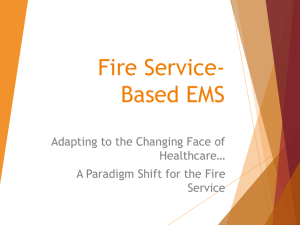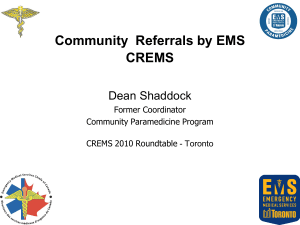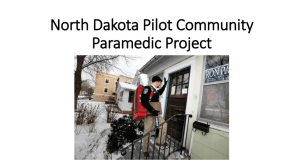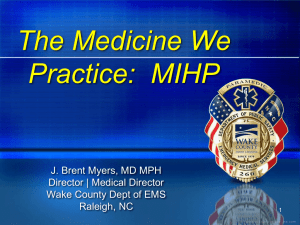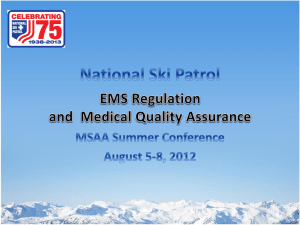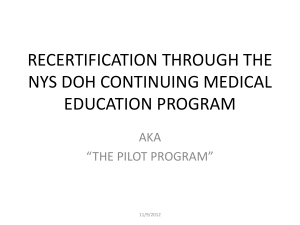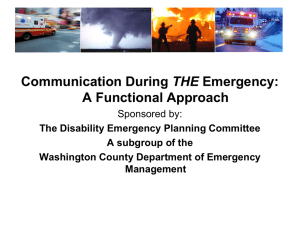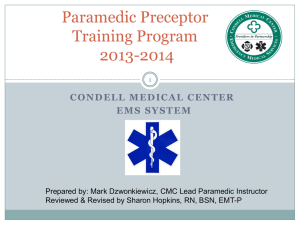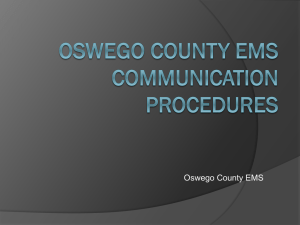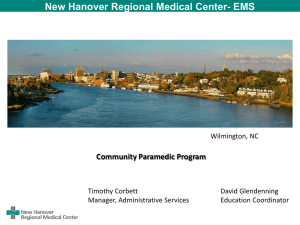PCFCA_Mtg_Mins_ 2013-10-03pwrpt PinnacleConf
advertisement
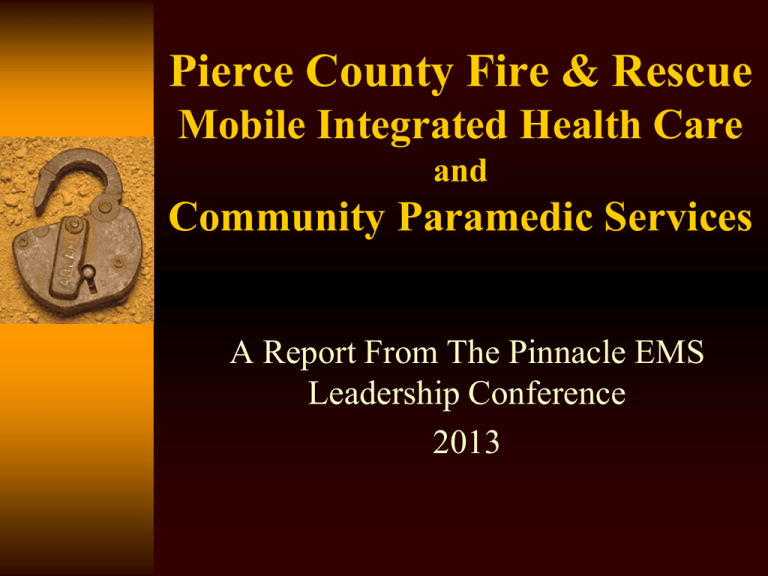
Pierce County Fire & Rescue Mobile Integrated Health Care and Community Paramedic Services A Report From The Pinnacle EMS Leadership Conference 2013 Our Mission Learn as much as possible about the Affordable Care Act Provide the PCFC&Cs with information and recommendations for future operations Pinnacle EMS Leadership Conf. 10 – PreConference Workshops on Monday & Tuesday 23 – Classes over the next three days Best EMS Leadership Conference – EVER ! Health Care Reform / ACA Provide Safe & Effective Healthcare to a Larger Population Provide that Care at a Reduced Cost Provide the Patients with a Positive Healthcare Experience Health Care Reform / ACA Provide Safe & Effective Healthcare to a Larger Population Health Insurance Coverage in the U.S., 2008 Uninsured 15% Medicaid/ Other Public 13% EmployerSponsored Insurance 52% Medicare 14% Private NonGroup 5% Total = 300.5 million NOTE: Includes those over age 65. Medicaid/Other Public includes Medicaid, SCHIP, other state programs, and military-related coverage. Those enrolled in both Medicare and Medicaid (1.9% of total population) are shown as Medicare beneficiaries. SOURCE: Kaiser Commission on Medicaid and the Uninsured/Urban Institute analysis of March 2009 CPS PPACA Goals & Objectives The Affordable Care Act reduces the number of Americans without health insurance: Health Care Reform / ACA Provide that Care at a Reduced Cost Where Medicare Leads….. The Others Will Follow Health Care Reform / ACA Provide the Patients with a Positive Healthcare Experience The Development of Accountable Care Organizations Accountable Care Organizations Who Will Become the ACOs A Major Change in How We Pay for Health Care : This will be the most significant change to healthcare as we know it since the inception of Medicare in 1966 A Major Change in How We Pay for Health Care : Fee for Services Will Be Replaced With… Pay for Performance Isolated Medical Care Will Become….. Bundled Service Integrated Holistic Health Care Accountable Care Organizations It’s anticipated that ACOs will be Compensated by Medicare and Other Insurance Companies Based on the Total Population of Patients They Serve and / or through the bundling of services If they provide the patient with a positive experience and good, holistic, patient centric health care and keep their patients out of the ED and Hospital they will make a profit Accountable Care Organizations Goal of the ACOs – Keep Patients Out of They Recognize that the ED and Hospital if In-Hospital Care Possible Expensive – Improve In-Patient Care to Reduce Errors Emergency and Complications Department Services – Improve Out-Patient are the Most Care to Reduce Expensive of All Re-Admissions Accountable Care Organizations EMS EMS ? EMS will continue to be the : Mobile Integrated Health Care Services Utilizing Community Paramedics May be Funded By The ACOs To Support Their Mission Mobile Integrated Health Care Services and Community Paramedics Provide Online and Telephone Consultation Services Utilizing Nurse Navigators Provide On-Scene Patient Assessments and Appropriate Level of Care If Transport is Required – Transport to the Most Appropriate Facility Provide the ACO’s Customer with Well Patient Assessments and Counseling Following their Discharge from the Hospital The ACOs Have Options Contract with a Public Service Agency (FDs) Contract with a Private Ambulance Service Create Their Own Hospital Based Service The Fire Service Options Where Do We Go From Here The Fire Service Options: Get Totally out of the Medical Business Concentrate on Fire and Rescue Only Let the Private Sector Provide “Mobil Integrated Health Care” The Fire Service Options: Do Nothing … Try to maintain our current operations – Over time our 911 responses will go down • ACOs may provide 711 service for their patients – ACOs & Insurance may or may not pay for primary first response and transport services The Fire Service Options: Each Individual Agency to Provide Community Paramedic Services for their area and try to contract with the ACOs for payment – Most expensive of all options – Smaller departments may not be able to support a Community Paramedic Program – ACOs may NOT want to contract with a multitude of individual fire based agencies when they can contract with one or two private service The Fire Service Options: Develop a Single Pierce County Fire Community Paramedic Program – – – – – Shared Cost Based on Population Served Shared coverage across the entire county One common agency to contract with ACOs Additional career path for IAFF members We already have the community’s trust in our ability to provide care and services ACA & EMS in the Future Fire/EMS needs to prove: “added value” to system o Continue what we do now—but do it even better: Improve patient outcomes Reduce adverse events and improve patient safety Gather data & prove that EMS impacts patient outcome How well do we measure our clinical and affective performance? o Fire/EMS is well positioned to serve as the “gatekeepers” to the healthcare system o Fire/EMS will need to embrace “expanded” roles in: Reducing hospital readmissions Community paramedic programs Prevention and education programs Mobile health services The Fire Service Action Items 0-24 Months Enlist and Partner with South Sound 911 to Provide Consulting Nurse and Nurse Navigator Services – (Current Dispatch Centers to provide this service until SS911 is up and running) Recommend SS911 utilize the MPDC EMD program which is readily accepted across the nation and easier to manage / Navigate non-emergent patients The Fire Service Action Items 0-24 Months Conduct a Needs Assessment / Gap Analysis What are the unmet public healthcare needs in our communities? Can Fire/EMS resources be utilized to address some of the identified gaps in care or service? Identify areas for potential short term pilot programs to measure effectiveness of Fire/EMS The Fire Service Action Items 0-24 Months Educate Major Stake Holders about the Role of Fire/EMS in Healthcare Reform Conduct a one or two day workshop for MPDs, Fire Commissioners, elected officials, Fire Administration and Union Officers, ACO and Managed Healthcare Officials, and the Department of Public Health Officials. Target Date: Spring 2014 The Fire Service Action Items 0-24 Months Officially Form and Manage the Pierce County Fire Service Consortium to provide Mobile Integrated Healthcare and Community Paramedic Services Send a Pilot group of paramedics through the Community Paramedic education program The Fire Service Action Items 0-24 Months Work with the Pierce County EMS office to expand our protocols to meet the needs of an expanded role Community Paramedic Continue to meet with the ACOs in our area to build solid and trusted relationships The Fire Service Action Items 0-24 Months Improve our CQI program and include customer satisfaction data Adopt the First Watch tracking system on a County Wide Basis – Fire Services and Law Enforcement Agencies – South Sound 911 – Pierce County DEM and PCHD The Fire Service Action Items 0-24 Months Explore the WAC and RCWs for any changes that need to be made with: – – – – – Scope of Practice Expanded Roles Transport Policies and Receiving Centers Fee for Service Etc. Develop pilot programs to test and evaluate needed changes The Fire Service Action Items 0-24 Months We need to continue to send our current and future EMS Leadership to the Pinnacle and other EMS Leadership Conferences…. Pierce County Fire Service Mobile Integrated Health Care and Community Paramedic Services What Comes Next ? We don’t know what we don’t know But if we prepare now We will be better positioned to move forward Conclusion The next decade will be turbulent for all EMS agencies – Huge Changes that will effect us all There will be opportunities to help shape EMS for the next generation o New roles and responsibilities o Increased integration into community and public health o Challenges in developing new reimbursement mechanisms We have a choice - try to maintain the status quo - or help drive the changes that will position fire/EMS to provide better care and service to our communities
